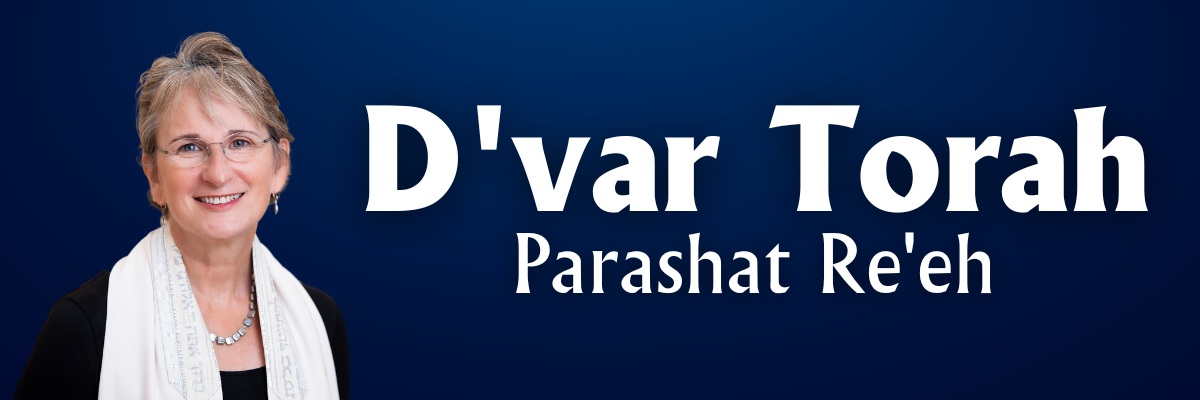Parashat Re'eh
08/09/2023 10:48:15 AM
Rabbi Amy Schwartzman
| Author | |
| Date Added | |
| Automatically create summary | |
| Summary |
 This week’s Torah portion is a continuation of the speech that Moses gives to Israelites as they prepare to enter the Land of Israel on their own. Warning that they face the choice between a life of blessings or a life of curses, he urges them to observe God’s commandments in the land that they are about to inhabit. Moses cautions the people not to be lured into idolatry by false prophets, family members, or friends. He commands them not to disfigure themselves (tattoos!) or eat anything harmful to their health. He reviews the idea of tithing, setting aside one-tenth of one’s produce (not only crops) for the stranger, orphan, and widow. He reminds them about the laws around the sabbatical year, forgiving of debts, fair treatment of slaves, and the observance of the three pilgrimage festivals – Pesach, Shavuot, and Sukkot.
This week’s Torah portion is a continuation of the speech that Moses gives to Israelites as they prepare to enter the Land of Israel on their own. Warning that they face the choice between a life of blessings or a life of curses, he urges them to observe God’s commandments in the land that they are about to inhabit. Moses cautions the people not to be lured into idolatry by false prophets, family members, or friends. He commands them not to disfigure themselves (tattoos!) or eat anything harmful to their health. He reviews the idea of tithing, setting aside one-tenth of one’s produce (not only crops) for the stranger, orphan, and widow. He reminds them about the laws around the sabbatical year, forgiving of debts, fair treatment of slaves, and the observance of the three pilgrimage festivals – Pesach, Shavuot, and Sukkot.
From the ten thousand-foot view, this appears to be a mish-mosh of diverse commandments. Some seem religious, others are social, and yet more are broadly ethical. I would suggest that the opening concept that unites all of them can be found in the first verse of the portion, Deuteronomy 11:26:
"See, this day I set before you blessing and curse. Blessing, if you obey the commandments of Adonai your God that I enjoin upon you this day and curse, if you do not obey the commandments of Adonai your God but turn away from the path that I enjoin upon you this day and follow other gods, whom you have not experienced.”
This opening sentence makes two important statements — ones that are so valuable to us as we prepare for our own new beginning with 5784, which will be here before we know it. (Please make sure to register for your High Holy Day tickets!)
The first message is that WE HAVE A CHOICE! Our tradition empowers us with free will. As we approach a new relationship with a new co-worker or teacher, or begin a new project at home or at the Temple, we decide how to approach that new venture. While we are not always fully in control 100% of the time, generally speaking, we direct our own actions. Our tradition reminds us that in so many dimensions of our lives, the choice is ours to be positive or negative, optimistic or pessimistic. The outcome of our choice can be a blessing or a curse. It is in our hands.
The second message comes from the list of commandments that follow the reminder that we have a choice and the command to choose blessing. The list is diverse, filled with commandments related to all parts of our lives. Through this, the tradition says that blessings can come to us in every part of our existence. We can choose blessings at home, in the Giant, on the beltway, or at work. Blessings are not restricted to conventional religious deeds. How we behave in each aspect of our lives is an opportunity to bring more kindness, righteousness, and justice into the world. This is as much a fulfillment of our religious duties as lighting Shabbat candles and fasting on Yom Kippur.
As we enjoy our last official month of summer, let us prepare for our new ventures ready to make good and positive choices. Let us take up the call to be a blessing in all dimensions of our lives. In doing so, may it be a good New Year.
Shabbat shalom,
Rabbi Amy Schwartzman
Tue, October 14 2025
22 Tishrei 5786
Join Our Mailing List
Privacy Settings | Privacy Policy | Member Terms
©2025 All rights reserved. Find out more about ShulCloud
